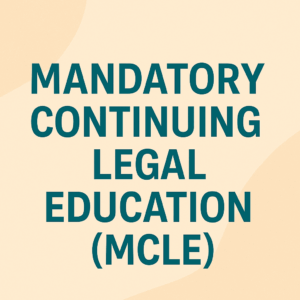Mandatory Continuing Legal Education (MCLE) is a required component of maintaining a law license. While attorneys must complete these credits, mediation training offers a strategic approach to fulfilling MCLE requirements that goes beyond mere compliance.
Understanding MCLE: More Than Just a Requirement
Attorneys are required to complete MCLE credits to maintain their professional licensure. This mandatory education serves a critical purpose:
- Ensuring legal professionals stay current with evolving laws
- Maintaining high standards of professional practice
- Providing opportunities for skill development
- Supporting ongoing professional competence
The Strategic Value of Mediation Training for MCLE
Skill Enhancement
Mediation training through MCLE credits delivers:
- Advanced negotiation techniques
- Sophisticated communication strategies
- Innovative conflict resolution skills
- Versatile professional capabilities
Comprehensive MCLE Credit Allocation
Top-tier mediation programs offer holistic MCLE credit coverage:
- Ethical practice development
- Professional skills training
- Substantive legal knowledge
- Advanced communication insights
Expanding Professional Opportunities
MCLE-certified mediation training provides attorneys with:
- New practice area insights
- Enhanced client service approaches
- Differentiating professional skills
- Innovative dispute resolution techniques
Selecting Effective MCLE-Certified Mediation Training
When choosing how to fulfill mandatory MCLE requirements, attorneys should consider programs that offer:
- Comprehensive credit allocation
- Recognized professional certification
- Practical, skills-focused curriculum
- Alignment with state MCLE standards
Maximizing Mandatory MCLE Credits
Since MCLE is a required professional obligation, attorneys can strategically approach their mandatory credits by:
- Selecting training with tangible skill development
- Choosing programs that offer practical professional insights
- Exploring training that opens new practice opportunities
- Focusing on high-value educational experiences
Conclusion: Navigating Mandatory MCLE Requirements
Mandatory Continuing Legal Education is a professional necessity. Mediation training provides attorneys with a meaningful way to fulfill these required credits, transforming a compliance obligation into an opportunity for professional growth and skill enhancement.
By strategically approaching MCLE requirements, attorneys can turn mandatory education into a valuable investment in their professional development.






